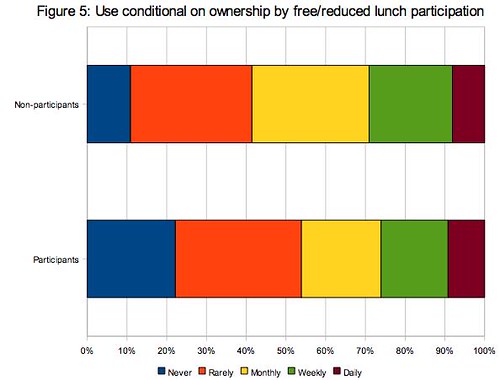As I said previously, I’ve been reading more. One of the online things I’ve been reading has been the group library blog In the Library with the Lead Pipe. It’s a long-form blog by six authors that gets to go a little more in-depth into library issues than your average blog. Recent posts I’ve enjoyed include this look at the idea of universal catalogs and this look at how to make bibliographic instruction “sticky” (memorable). The thing I like abotu this blog is that in addition to having really good writing and heaps of links to more information, the authors actually comment on each other’s posts so that you get more of a sens eof the authors’ perspectives and also some built-in discussion at the end of nearly every essay. This is one of my favorite new blogs of 2008.
Month: December 2008
Who Has What – Vermont libraries’ automation systems
Vermont has a new State Librarian and I’ve been diving into more of the reports from the state Department of Libraries lately. Their most recent newsletter mentioned the Who Has What page which is a list of which vendors all the automated lirbaries in Vermont are using for their catalogs. What isn’t mentioned is that Vermont has about 192 public and community libraries. The DoL list has 86 libraries listed in the public section. You’re getting that little unstated statistic, right?
on reading – librarians vs. writers
I’ve been blogging less because I’ve been reading more. One of the things to catch my attention lately was The Lion and the Mouse (printable), a months-old piece from the new Yorker about Anne Carroll Moore, the woman who “more or less invented the children’s library.” At the same time as she was opening up libraries to and for children, she was also exerting her considerable power over what books got purchased at NYPL at elsewhere. The essay concerns
the end of Moore’s influence [which] came when, years later, she tried to block the publication of a book by E. B. White. Watching Moore stand in the way of “Stuart Little,†White’s editor, Ursula Nordstrom, remembered, was like watching a horse fall down, its spindly legs crumpling beneath its great weight.
It’s a wonderful read; even though the librarian in it is wincingly marmish and pretentious, she’s also well-read and driven. It’s a great look at an imperfect person in an imperfect profession with some bonus trivia about Stuart Little in there for good measure. Please consider reading it.
does giving out laptops help or hinder the digital divide?
Interested in the actual educational effects of giving laptops to students? Some interesting conclusions from a paper by Jacob Vigdor entitled Scaling the Digital Divide: Home Computer Technology and Student Achievement (pdf). The study is a North Carolina-wide look at who has access to broadband, home computers and what the test score correlations are with these facts, if any. A few notable pullquotes.
[T]he introduction of home computer technology is associated with modest but statistically significant and persistent negative impacts on student math and reading test scores. Further evidence suggests that providing universal access to home computers and high-speed internet access would broaden, rather than narrow, math and reading achievement gaps.
[T]he introduction of high-speed internet service is associated with significantly lower math and reading test scores. Moreover, broadband internet is associated with wider racial and socioeconomic achievement gaps. One interpretation of these findings is that home computer technology is put to more productive use in households with more effective parental monitoring.
Students who own a computer but never use it for schoolwork have math test scores nearly indistinguishable from those without a home computer, while scoring slightly better than reading. Students reporting almost daily use of their home computer for schoolwork score significantly worse than students with no computer at home.
Students who gain access to a home computer between 5th and 8th grade tend to witness a persistent decline in reading and math test scores. There is little evidence that more intensive computer use for schoolwork offsets these negative effects.
Surprised? I was, a little [dweinberger]
